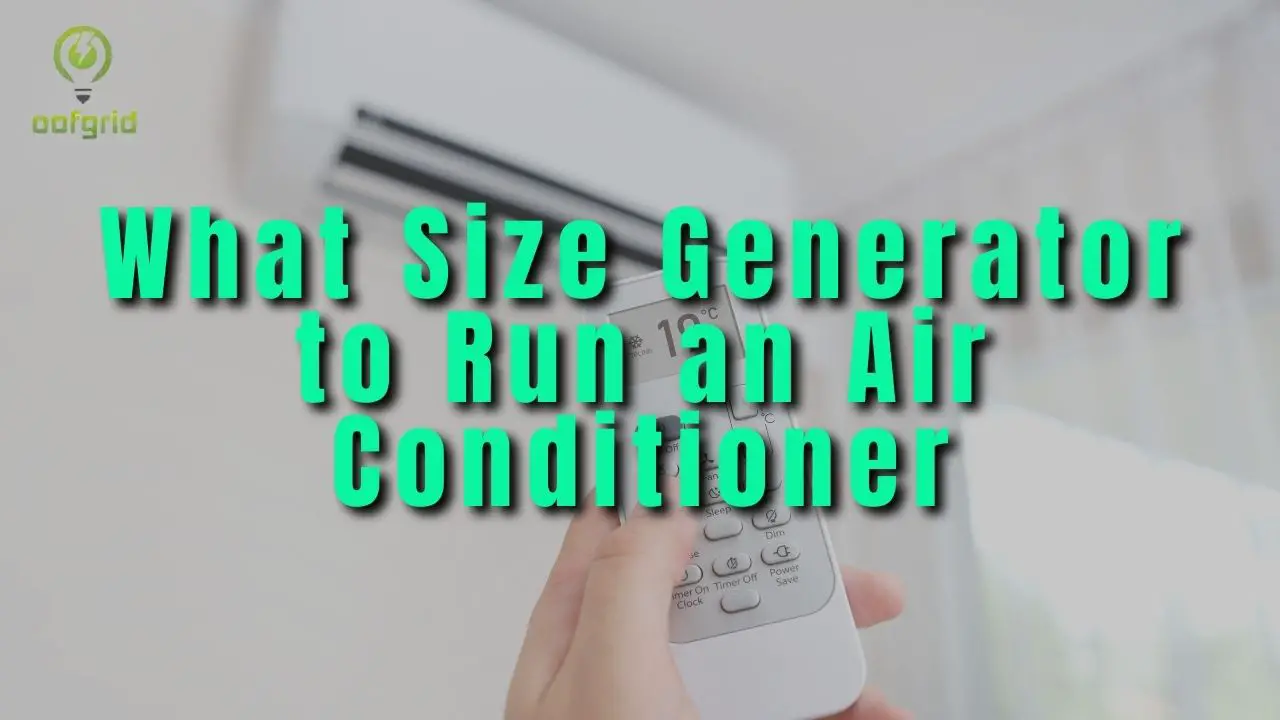We are having a round of snow storms in my part of the country and we just had to run on our gas generator for 5 days!
We were comfortable, but I was quite glad to have the generator.
When you are reading generator specifications, how will you know if your generator can run your freezer?

Contents
Find the Right Size Generator for your Freezer
Generator size is always described in watts of power output. You can determine how many watts you need to run your freezer by reading the label inside the lid of the freezer. See how many watts it uses while running and how many starting watts are required.
When a house is wired for electricity things are run on 20 amp circuits. If you look at your fuse box most of the breakers are 20 amp, so you can multiply that by 120 (the volts of household energy) and that will give you the watts you need to run whatever is on that circuit.
If your generator is more than 2400 and your freezer is connected to a single circuit breaker in your box, you are covered.
The compressor is the biggest draw from a freezer. You can hear it turn on when you are running your freezer and you will hear your generator run harder when the compressor switches on.
This is not a problem, generators have running watts and surge watts. They are designed to handle the ebb and flow of energy needs of your freezer. The surge amps are also called the peak wattage.
When you are calculating your generator needs it is always good to estimate 10% more than you think you need.
Most of the time your appliances will not all peak at the same time, but just in case you want to have a little wiggle room.
Choosing A Generator for your Freezer
Now that you know how much power you need, you can select which type of generator suits your home.
There are 4 main types of generators:
- Open Frame
- Inverter
- Digital Hybrid
- Standby or Whole House
Open Frame
Open Frame generators are normally gas generators. They are usually the least expensive type of generator, but they cannot be run indoors.
Open Frame generators are often stored in the garage and they are run outside in case of an emergency and extension cords are run to the generator to supply power where necessary. They can also be powerful enough to be connected to the fuse box to power the whole house.
Consider the layout of your home and how accessible it would be to use an open frame generator to run your freezer.
Inverter Generator
Inverter generators are designed to provide a more controlled supply of power to electronics and other appliances directly.
Inverter generators also need to be run outside, they are combustion engines and they produce exhaust that can be deadly if not vented properly.
Inverter generators are significantly quieter, so may be a better fit if you live with very close neighbors.
They are also easier to transport because they are more compact. This might be important if you do not have much storage space.
Digital Hybrid
Digital Hybrid generators are a newer class or generator that is becoming more popular.
They are push button start generators that are quieter than open frame generators.
These generators are becoming more popular because they are easier to use, have a battery that allows for a push button start. They also have several modes to allow the generator to run more efficiently.
Whole House Generator
A whole house generator is permanently installed and allows your whole house to run uninterrupted if the power grid goes down.
This is the most expensive option and it does require regular maintenance and upkeep. I found this video helpful to put it into perspective. This guy has worked with whole house generators and he has some good insight.
How Much Fuel Does a Generator Use to Power a Freezer?
When planning your backup power solution be sure to consider fuel needs. Most of the generators we have talked about require fuel to generate electricity.
Check your generator and be sure to get the correct fuel for your generator. Most generators run on gasoline, but some do run on diesel.
Diesel generators are generally more fuel efficient and require less maintenance than gas generators. They may be louder when idling, but tend to run at the same noise level as gas generators.
Whichever you choose, be sure to get a gas can to transport the fuel from the gas station.
A gas generator burns roughly .75 gallons of gas per hour, more if it is a very large generator, so in a 24 hour period, expect to use 18 gallons.
Most standard gas cans hold 5 gallons, so you would need 4 full gas cans to run your generator for 24 hours.
In a long term power outage this would be a major part of your day. We recently had a 5 day power outage and getting gas and filling the generator was a big part of the week. We were so glad we had a gas generator and we live very close to a gas station, but if you do not, consider a solar generator or alternative fuel source.
What size generator do I need for my freezer plus all my other appliances?
Go through your house and check everything that is critical, everything that you want to be able to run on the generator.
We have created this handy checklist for you to use when you are walking around your house. Record the amps and volts of all of these appliances on the printable checklist.
Generator Needs Checklist
| Appliance | Watts | Starting Watts |
|---|---|---|
| Refrigerator/Freezer | ||
| Deep Freezer | ||
| Sump Pumps | ||
| Heat | ||
| Electric Fireplace | ||
| Air Conditioning | ||
| Lights | ||
| Charging Phones and Computers | ||
| Medical Equipment | ||
| Well Pump | ||
| Tools or Equipment | ||
| Microwave | ||
| Toaster Oven | ||
| Coffee Maker | ||
| Television |
Watts = amps x volts.
So, I looked at the label for my refrigerator/freezer. I see that the amps are 5.3 and the voltage is 115. I would multiply the watts times the amps to see that the total running watts is 609.5. This is the biggest draw for many households.
Do this with all your systems, heating, cooling, microwave, freezer, etc. Then multiply that number by 1.1 to add 10% as a cushion for your energy needs.
You may find that some of your appliances list a starting and running wattage, if that is the case be sure to account for that added energy. A starting wattage will only be needed when starting the appliance. If this brings you close to your power limit, consider starting this system or appliance first before adding anything else to the generator’s load.
Do I need a whole house generator?
Whole house generators might seem like a great solution so that you never lose power again, but there are some things to consider.
You may be looking at all this math and considering just hiring this job out to a whole house generator company.
This seemed like a great solution until I looked into it a bit more.
These systems are enormously expensive and require regular maintenance. Think of this like an extra car that you don’t drive very often.
If you had a spare car parked in the garage you would have to check the engine every so often, keep up with oil changes and protect the paint.
It is the same with a whole house generator. Some have built-in regular diagnostic systems that run checks automatically, but they may come up with errors that require a service call.
Whole house generators must also be protected against insects and rodents. I heard some crazy stories about very complex, expensive generators being destroyed by mice and ants.
All generators will need to be maintained, but if you choose a whole house generator, it is a much larger investment, not only up front but also in regular maintenance.
However, if you live in an area where power is unreliable, it is worth considering having your own means of keeping the lights on. I recommend you consider a solar generator for a more stable solution. These systems are very robust and will not require off-site fuel.






